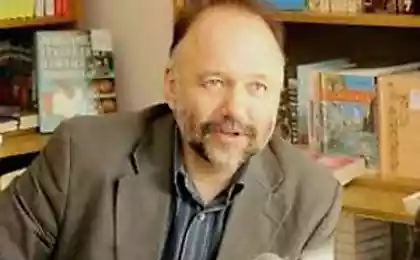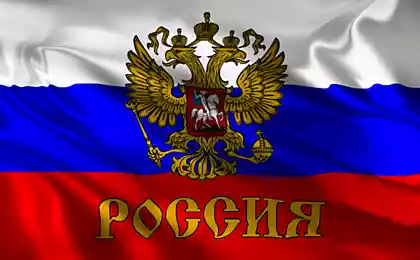495
From shady scientists to charlatans in Russia combine science and business
Fifty one million two hundred forty three thousand one hundred forty five
© David Schwen
For a scientist the money usually are not a determining factor in the choice of profession, but they often influence the choice of those or other career options. In Russia, because of the nature of science funding and the state of the economy there are several models of combining entrepreneurial and scientific activities.
The majority of scholars about the same answers the question of why they went into science: they could motivate the desire to improve the world, increase of human knowledge, exploring the unknown, the desire to satisfy one's own curiosity and hunger for knowledge, the desire to be at the forefront of human development or simply get pleasure from the experiments. The factor of money in that list is usually somewhere in the tail. Despite this, the financial issue sometimes causes among scientists some discomfort. The level of their wages, even in the most affluent countries in science around middle marks, and comparing their earnings with much more income familiar from, for example, the financial sector, the scientist cannot help thinking about the injustice of this situation.
So, according to research by the magazine New Scientist in 2013 in the UK and the USA the average salary of a scientist is 35 900 000 and 46 pounds, respectively, which though provides a comfortable standard of living, but in both cases corresponds to the average salary in the country, and greatly inferior to the salaries of many professionals — so, for example, receives the engineer of the London underground. This factor is certainly one of the determinants in deciding on the creation side of the business.
Other important factors is the lack of confidence of commercial or public structures ready to implement some ideas, the scientists, the simple lack of organizations able to do it, and finally, the factor "why not", the benefit of the same United States and great Britain created favorable conditions for business development scientists. It and organizational problems are solved (in many institutions, scientists be given free time for the realization of their business initiatives) and existing legislation (e.g. the act Bayh-Dole).
For Russia, in addition to the reasons for the diversification of the activities of the scientists listed above, a characteristic and peculiar to the country. Below are some types of scientists-entrepreneurs, illustrating these reasons.
Shadow scientistsShadow scientists — one of the first encountered of the types of scientists-entrepreneurs. They appeared in a period of lack of money in science, which lasted until the beginning of zero, the time when those who could, emigrated from Russia or looking for any other work and remaining in science were living below the poverty line. Capacity of research organizations for the most part idle idle, but was working and competitive. The first business model to shadow scientists and entrepreneurs was the model of outsourcing of the appendage. Using established overseas business connections, they collected orders mainly on the experimental work that was carried out de facto using the capacity of public research organizations (beginning employees, ending with the premises), and de jure — specially created for this purpose firms.
Thus, for the customer it was all perfectly legal he signed a contract with some company and with him and paid. The range of such works could be the most wide — from sophisticated laboratory synthesis to studies of the physical properties of materials. The management of scientific organizations when it turned a blind eye on the activities of the LLC. First, it was one of the few stable earnings, albeit gray, not only for the organizer of such activities, but for all scientists involved in it, — he ensured the retention of staff at the Institute and, thus, the continuation of fundamental research. And secondly, part of the proceeds from underground activities, was to conduct these studies.
Today is the shadow entrepreneurial scientists still exist, but their number decreased markedly — most came out of the shadows. It's hard to say what motivates the shadow of entrepreneurs for continuation of the activities is 10-years — greed, uncertainty about the future or fear of losing has been tested for years scheme, if in Russia there will be a next crisis and the funding will cease.
Spin-offsThere are two main reasons why there is no need of shadow schemes and entrepreneurial scientists came out of the shadows: the first appeared in the public funding of science has increased the number of funds that provide research grants, size of grants and the likelihood that the grant will reach the final consumer; the second, a resurgent economy has formed an internal demand for research and services in such quantity that made possible the creation of enterprises, the relevant tax and labor laws.
At universities and institutes began to appear EN masse centres, who inherited the structure and personnel composition of the relevant shadow enterprises, however, legally the former part of the institutions. Thus, emerged from the shadow of the scientist-entrepreneur remains in the rank of head — under existing legislation, the entire cash flow, and intellectual property are governed by the University/institution. However, he lost the aura of Saviour of science and were more in the genre of good Manager, which in addition to its core academic activities was provided by colleagues of the scientists additional, and not only earnings.
The activities of these centers is usually of an applied nature (all the same set of services as in the 90s), and rarely innovative. This picture only changed after 2009, when was adopted the Federal law № 217 "On amendments to certain legislative acts of the Russian Federation concerning creation budgetary scientific and educational institutions of economic societies for the purposes of practical application (implementation) of intellectual activity results". Now, on the basis of the scientific organization can be created enterprises, which itself is a scientific organization had 100% share in the authorised capital and could not claim the right of intellectual property, it remained the founder. Thus, this law, along with its direct function of the stimulus for the creation of innovative businesses, enabled the spin-off entrepreneurs to regain control of their businesses.
GrantovoyGrantovoy replaced the shady scientist-entrepreneurs as the most numerous class in the beginning. It is, as a rule, scientists engaged in fundamental research, the main source of funding are grants from the state and commercial foundations such as RFBR, RSF and others. Grantovoy usually work in major scientific centers, and having experienced some discomfort from the system of financing "Fund — scientific centre group", create a small business that would have replaced the chain in the science center.
"Some discomfort" means at least two factors. The first is bureaucracy: speaking as a mediator between the research group and the Foundation, a scientific organization does not take care of bureaucratic tasks, but rather, straining for more, and in conjunction with the second factor — the fact that a scientific organization takes over the administration of money allocated by the Fund was the desire to get rid of such a mediator is understandable.
Moreover, the administration is not only the complexity of procurement procedures needed for research equipment, but also that a scientific organization, based on which a survey takes part of the amount of grants — from 20% to 30%. The average grant size, for example, the RFBR is about 500 000 rubles, and the deduction from such a big share is often critical. Although the moral justification of the motivation of scientists-grantovogo clear, however often their businesses have signs one-day firms, and gratuated with the big stretch can be called an entrepreneur.
Unrecognized heroesThe small type of Russian scientist-entrepreneur. The decision to become an entrepreneur they have at first glance does not seem anything out of the ordinary — all the same desire to create something important for the world, not trusting his idea of outsiders. Unique their motivation makes absolute belief in the greatness of their ideas, lack of confidence in this scientific community, indiscriminate sources of funding (investments for the implementation of their projects they find in the most unexpected places) and immunity to criticism of colleagues. In other words, that many scientist-entrepreneurs, on the one hand constrained by Linus Pauling (renowned scientist, confident in the use of vitamin C and so did this and not convinced), and with another — Viktor Petrik (entrepreneur, author of several pseudoscientific studies, full member of RAEN, a man with in the scientific community as a quack).
An example of this type is Vladimir Khavinson — corresponding member of RAMS, Director of the Institute of Bioregulation and gerontology, NWB of RAMS, member of the International Association of gerontology, with many publications and monographs, most of which is devoted to studies of the effect of some peptides on the aging process in the human body. Despite the fact that the results of these studies and conclusions about the effectiveness of the peptides was cool encountered by the academic community (as reflected, for example, a low level of citation of works), Khavinson quite actively commenced the capitalization of their ideas in the light of the establishment of production, promotion and marketing of drugs for prolonging life. At the same time promoting quite aggressively — for example, organized academic conferences, which are essentially advertising companies. In the marketing tools such as MLM, the operation of the merit Havinson, preuvelicheniya of the research results. The reason why the activity of the pineal peptide suppressed and even not regulated, apart from the fact that these peptides was as dietary Supplements (the market which in itself is poorly regulated), we can only guess — perhaps a lobby, formed due to the right connections, and perhaps, it really is an underrated product.
Despite the financial thaw in the science of the last ten years, it is unlikely given the types of entrepreneurs, as if doubtful, they did not seem to sink into Oblivion. The main motivation for such activities still takes place is the uncertainty about the future in light of the fall of the ruble, oil prices and the coming crisis.
Source: theoryandpractice.ru
© David Schwen
For a scientist the money usually are not a determining factor in the choice of profession, but they often influence the choice of those or other career options. In Russia, because of the nature of science funding and the state of the economy there are several models of combining entrepreneurial and scientific activities.
The majority of scholars about the same answers the question of why they went into science: they could motivate the desire to improve the world, increase of human knowledge, exploring the unknown, the desire to satisfy one's own curiosity and hunger for knowledge, the desire to be at the forefront of human development or simply get pleasure from the experiments. The factor of money in that list is usually somewhere in the tail. Despite this, the financial issue sometimes causes among scientists some discomfort. The level of their wages, even in the most affluent countries in science around middle marks, and comparing their earnings with much more income familiar from, for example, the financial sector, the scientist cannot help thinking about the injustice of this situation.
So, according to research by the magazine New Scientist in 2013 in the UK and the USA the average salary of a scientist is 35 900 000 and 46 pounds, respectively, which though provides a comfortable standard of living, but in both cases corresponds to the average salary in the country, and greatly inferior to the salaries of many professionals — so, for example, receives the engineer of the London underground. This factor is certainly one of the determinants in deciding on the creation side of the business.
Other important factors is the lack of confidence of commercial or public structures ready to implement some ideas, the scientists, the simple lack of organizations able to do it, and finally, the factor "why not", the benefit of the same United States and great Britain created favorable conditions for business development scientists. It and organizational problems are solved (in many institutions, scientists be given free time for the realization of their business initiatives) and existing legislation (e.g. the act Bayh-Dole).
For Russia, in addition to the reasons for the diversification of the activities of the scientists listed above, a characteristic and peculiar to the country. Below are some types of scientists-entrepreneurs, illustrating these reasons.
Shadow scientistsShadow scientists — one of the first encountered of the types of scientists-entrepreneurs. They appeared in a period of lack of money in science, which lasted until the beginning of zero, the time when those who could, emigrated from Russia or looking for any other work and remaining in science were living below the poverty line. Capacity of research organizations for the most part idle idle, but was working and competitive. The first business model to shadow scientists and entrepreneurs was the model of outsourcing of the appendage. Using established overseas business connections, they collected orders mainly on the experimental work that was carried out de facto using the capacity of public research organizations (beginning employees, ending with the premises), and de jure — specially created for this purpose firms.
Thus, for the customer it was all perfectly legal he signed a contract with some company and with him and paid. The range of such works could be the most wide — from sophisticated laboratory synthesis to studies of the physical properties of materials. The management of scientific organizations when it turned a blind eye on the activities of the LLC. First, it was one of the few stable earnings, albeit gray, not only for the organizer of such activities, but for all scientists involved in it, — he ensured the retention of staff at the Institute and, thus, the continuation of fundamental research. And secondly, part of the proceeds from underground activities, was to conduct these studies.
Today is the shadow entrepreneurial scientists still exist, but their number decreased markedly — most came out of the shadows. It's hard to say what motivates the shadow of entrepreneurs for continuation of the activities is 10-years — greed, uncertainty about the future or fear of losing has been tested for years scheme, if in Russia there will be a next crisis and the funding will cease.
Spin-offsThere are two main reasons why there is no need of shadow schemes and entrepreneurial scientists came out of the shadows: the first appeared in the public funding of science has increased the number of funds that provide research grants, size of grants and the likelihood that the grant will reach the final consumer; the second, a resurgent economy has formed an internal demand for research and services in such quantity that made possible the creation of enterprises, the relevant tax and labor laws.
At universities and institutes began to appear EN masse centres, who inherited the structure and personnel composition of the relevant shadow enterprises, however, legally the former part of the institutions. Thus, emerged from the shadow of the scientist-entrepreneur remains in the rank of head — under existing legislation, the entire cash flow, and intellectual property are governed by the University/institution. However, he lost the aura of Saviour of science and were more in the genre of good Manager, which in addition to its core academic activities was provided by colleagues of the scientists additional, and not only earnings.
The activities of these centers is usually of an applied nature (all the same set of services as in the 90s), and rarely innovative. This picture only changed after 2009, when was adopted the Federal law № 217 "On amendments to certain legislative acts of the Russian Federation concerning creation budgetary scientific and educational institutions of economic societies for the purposes of practical application (implementation) of intellectual activity results". Now, on the basis of the scientific organization can be created enterprises, which itself is a scientific organization had 100% share in the authorised capital and could not claim the right of intellectual property, it remained the founder. Thus, this law, along with its direct function of the stimulus for the creation of innovative businesses, enabled the spin-off entrepreneurs to regain control of their businesses.
GrantovoyGrantovoy replaced the shady scientist-entrepreneurs as the most numerous class in the beginning. It is, as a rule, scientists engaged in fundamental research, the main source of funding are grants from the state and commercial foundations such as RFBR, RSF and others. Grantovoy usually work in major scientific centers, and having experienced some discomfort from the system of financing "Fund — scientific centre group", create a small business that would have replaced the chain in the science center.
"Some discomfort" means at least two factors. The first is bureaucracy: speaking as a mediator between the research group and the Foundation, a scientific organization does not take care of bureaucratic tasks, but rather, straining for more, and in conjunction with the second factor — the fact that a scientific organization takes over the administration of money allocated by the Fund was the desire to get rid of such a mediator is understandable.
Moreover, the administration is not only the complexity of procurement procedures needed for research equipment, but also that a scientific organization, based on which a survey takes part of the amount of grants — from 20% to 30%. The average grant size, for example, the RFBR is about 500 000 rubles, and the deduction from such a big share is often critical. Although the moral justification of the motivation of scientists-grantovogo clear, however often their businesses have signs one-day firms, and gratuated with the big stretch can be called an entrepreneur.
Unrecognized heroesThe small type of Russian scientist-entrepreneur. The decision to become an entrepreneur they have at first glance does not seem anything out of the ordinary — all the same desire to create something important for the world, not trusting his idea of outsiders. Unique their motivation makes absolute belief in the greatness of their ideas, lack of confidence in this scientific community, indiscriminate sources of funding (investments for the implementation of their projects they find in the most unexpected places) and immunity to criticism of colleagues. In other words, that many scientist-entrepreneurs, on the one hand constrained by Linus Pauling (renowned scientist, confident in the use of vitamin C and so did this and not convinced), and with another — Viktor Petrik (entrepreneur, author of several pseudoscientific studies, full member of RAEN, a man with in the scientific community as a quack).
An example of this type is Vladimir Khavinson — corresponding member of RAMS, Director of the Institute of Bioregulation and gerontology, NWB of RAMS, member of the International Association of gerontology, with many publications and monographs, most of which is devoted to studies of the effect of some peptides on the aging process in the human body. Despite the fact that the results of these studies and conclusions about the effectiveness of the peptides was cool encountered by the academic community (as reflected, for example, a low level of citation of works), Khavinson quite actively commenced the capitalization of their ideas in the light of the establishment of production, promotion and marketing of drugs for prolonging life. At the same time promoting quite aggressively — for example, organized academic conferences, which are essentially advertising companies. In the marketing tools such as MLM, the operation of the merit Havinson, preuvelicheniya of the research results. The reason why the activity of the pineal peptide suppressed and even not regulated, apart from the fact that these peptides was as dietary Supplements (the market which in itself is poorly regulated), we can only guess — perhaps a lobby, formed due to the right connections, and perhaps, it really is an underrated product.
Despite the financial thaw in the science of the last ten years, it is unlikely given the types of entrepreneurs, as if doubtful, they did not seem to sink into Oblivion. The main motivation for such activities still takes place is the uncertainty about the future in light of the fall of the ruble, oil prices and the coming crisis.
Source: theoryandpractice.ru
The British branch of Nestle is to produce electricity from unsold candy
Near-death experience of a Nazi concentration camp prisoner Tence Klein























